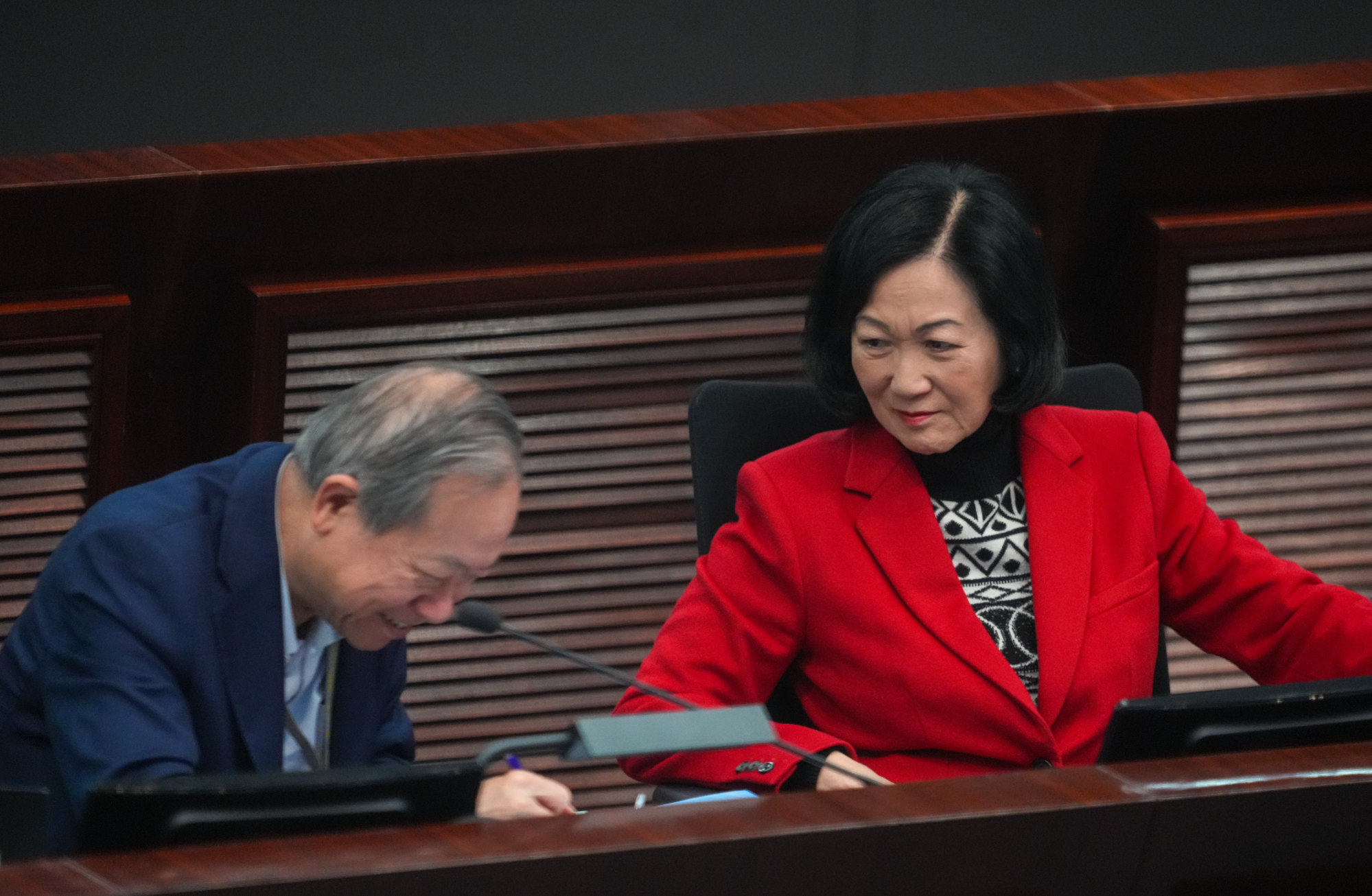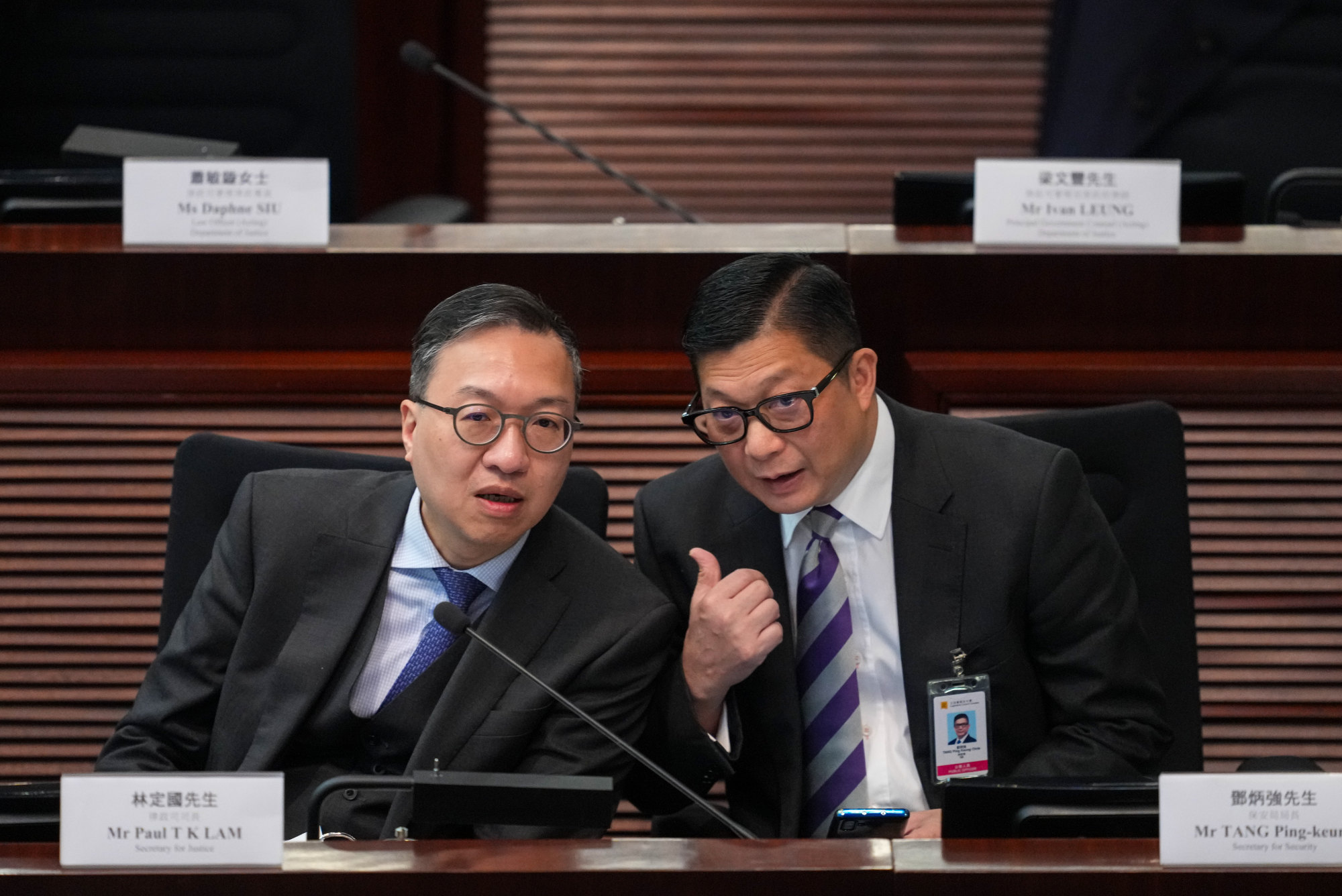
Hong Kong lawmakers raise concerns over scope of interference offence under proposed domestic security legislation
- Security chief seeks to dismiss fears quickly, suggesting only those who had intentions to interfere with affairs and used improper means might be held liable
- Justice minister also says sharing fake government documents might come under offences covering state secrets
Lawmakers on Sunday expressed concern the scope of “external interference” under Hong Kong’s draft domestic security law could hamper regular academic exchanges and business dealings, after officials said anyone working with a foreign organisation could be viewed as collaborating with an “external force”.
But the city’s security minister sought to dismiss such fears quickly, suggesting only those who had intentions to interfere with affairs and used improper means might be held liable.
The comments emerged as lawmakers continued to scrutinise the Safeguarding National Security Bill, vetting at least 73 out of 181 of the proposed legislation’s clauses after three straight days of meetings.
The marathon vetting process is expected to continue until Monday evening, with the Legislative Council’s welfare panel rescheduling a meeting to give lawmakers on the bills committee more time.
Part of the proposed legislation seeks to criminalise people who have the intention to interfere with government, court, legislative or electoral affairs by “improper means” through collaborating with external forces.
Offenders are liable to a maximum sentence of 14 years in prison.

Some lawmakers asked for a “white list” of activities that would be allowed under the clauses, as they worried the scope of “external interference” could hamper regular academic exchanges and business dealings.
Lawmaker and Executive Council convenor Regina Ip Lau Suk-yee said: “It is common that some former senior officials of overseas countries will join policy think tanks as directors. What if a local think tank cooperates with such an overseas think tank?”
Jeffrey Lam Kin-fung, also an executive councillor, expressed concern that an overseas bank could fall under the category of “external interference” for releasing economic reports that were critical of the business outlook of mainland China and Hong Kong.
While Secretary for Security Chris Tang Ping-keung said working with foreign organisations could be seen as “collaborating with an external force” under the proposed law, he was quick to dismiss fears one could be arrested just for doing so.
Tang told lawmakers: “This is absolutely not an offence. For committing external interference, one has to be proven to have the intention to bring about an interference effect and use improper means.
“Purely cooperation [with overseas organisations] could be counted as collaborating with an external force at the most.”
Ip argued that it could have a labelling effect and discourage young people from having exchanges with overseas groups.
Tang said: “There is no need to make such a fuss over [the choice of word in the bill]. Exchange is a neutral word, not an offence.”
Some lawmakers also questioned whether it was fair to hold the landlord or operator of premises responsible if they allowed an organisation that had been banned by the authorities for national security reasons to hold meetings or activities at their places.
Tommy Cheung Yu-yan, who represents the catering sector in the legislature, said: “Many people simply won’t know which group has been outlawed. Or what should the operator do if the people put up a banner of the banned group in the middle of a meal?”
Cheung asked the government to release a list of banned organisations for business operators.
The morning’s discussions focused on offences related to state secrets as legislators sought a clear definition for a clause that suggested “unlawful disclosure of information, etc that appears to be a confidential matter” could be deemed illegal.
Secretary for Justice Paul Lam Ting-kwok said the clause would target public officers and government contractors who “give out false or fake information” with the intention of endangering national security.

He outlined a theoretical scenario where a government security official created a falsified “confidential” document with the aim of spreading claims that a foreign country planned to launch a military attack on Hong Kong.
“The public officer gives out fake confidential information and makes people believe that it is true. It will trigger social unrest and instability in the society, causing national security risks,” the minister said.
Lam said that determining if such an action came under offences concerning state secrets depended on whether it was intended to prejudice the interests of the central or local governments.
Ip, who served as security minister when authorities tried to introduce an earlier version of the bill in 2003, also raised questions about the circumstances where spreading false information could be considered a security threat.
“Say I spread some innocuous fake news, such as the government giving out HK$30,000 [US$3,836] in cash handouts in the budget, and people were disappointed in the end. Will I be guilty?” she asked.
Hong Kong Article 23 penalties similar to those in other common law jurisdictions
Lam said that even if the official in that scenario had not violated the security law, they could still be held liable for misconduct in public office, adding that officials “should not tell lies”.
University of Hong Kong law professor and former Basic Law committee member Albert Chen Hung-yee said mainland China had only recorded a few cases of state secrets being illegally disclosed, with all of them involving government officials.
The constitutional law specialist also cautioned Hongkongers against the bill’s sedition offences as sharing such content could lead to a hefty sentence. He argued the tough stance was reasonable in the context of national security.
“But courts have much discretion [in terms of sentencing]. Even when the maximum penalty is heavy for some offences, if the case isn’t very serious, the court can hand out a shorter sentence,” Chen said.
Additional reporting by Jess Ma


